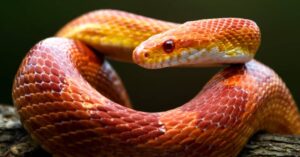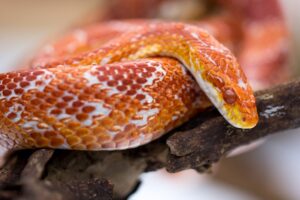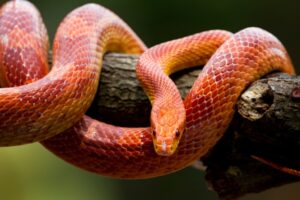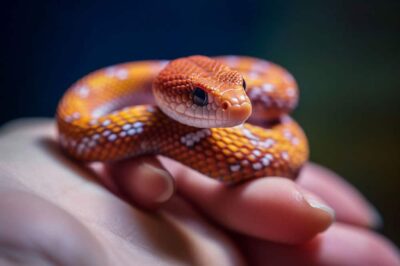So you’ve got a curiosity about corn snakes and their potential danger, huh? Well, let’s dive right into it. When it comes to the question of is a corn snake poisonous, the good news is that you can take a big sigh of relief.
Corn snakes, scientifically known as Pantherophis guttatus, are not poisonous. In fact, they’re among the more popular choices for snake enthusiasts and pet owners due to their docile nature and striking appearance.
So, if you’ve been wondering about the safety of having a corn snake as a companion, rest assured – they may look fierce, but venom is definitely not in their repertoire. Now, let’s unravel the fascinating world of corn snakes together!
Are corn snakes poisonous?

No, corn snakes (Pantherophis guttatus), commonly kept as pets, are not poisonous. They are non-venomous and pose no threat to humans. While they may bite if they feel threatened, their bites are generally harmless and rarely result in any significant effects. Corn snakes are constrictors, meaning they subdue their prey by constriction rather than relying on venom.
It’s important to note the distinction between venomous and non-venomous snakes. Venomous snakes produce venom and use it to immobilize or kill their prey, while non-venomous snakes lack this capability.
In addition, corn snakes fall into the non-venomous category, and they are popular among reptile enthusiasts due to their docile nature and attractive color patterns.
What happens if bitten by a corn snake?
Corn snakes are generally not harmful to humans. While they have teeth, their bites are not venomous. If you are bitten by a corn snake, the bite is likely to be relatively painless and cause only minor discomfort. The primary concern would be the risk of infection, as with any animal bite.
It’s important to keep the bite clean to minimize the risk of infection. Wash the bite area with mild soap and water and apply an antiseptic ointment. If there are any signs of infection, such as redness, swelling, or increasing pain, it’s advisable to seek medical attention.
Remember that corn snakes typically bite as a defensive reaction when they feel threatened or scared. Proper handling and care can help minimize the likelihood of a bite. If you are unsure about handling a corn snake or any other reptile, it’s a good idea to seek advice from experienced reptile owners or herpetologists.
Safety tips for handling corn snakes
Handling corn snakes can be a rewarding experience, but it’s essential to follow some safety guidelines to ensure the well-being of both the snake and the handler.
Here are some safety tips for handling corn snakes:
- Wash Your Hands: Before handling a corn snake, wash your hands thoroughly with mild soap and water. This helps remove any scents or oils that might be on your hands, which can be important for the snake’s comfort.
- Handle Gently: Corn snakes are generally docile, but sudden movements or rough handling can stress them. Approach the snake calmly and handle it gently but securely. Avoid grabbing or squeezing the snake tightly.
- Support the Body: When picking up a corn snake, support its body along its length. Snakes feel more secure when they have support beneath them. Avoid holding only the head or tail.
- Watch for Signs of Stress: Be attentive to the snake’s behavior. Signs of stress may include hissing, defensive postures, or rapid movements. If the snake shows signs of stress, it’s best to put it back into its enclosure.
- Handle in a Safe Environment: Choose a calm and quiet location for handling your corn snake. Avoid areas with a lot of noise, sudden movements, or other potential stressors.
- Be Mindful of Temperature: Corn snakes are ectothermic, meaning they rely on external heat sources to regulate their body temperature. Ensure that the room is at a comfortable temperature for the snake, and avoid exposing it to extreme temperature changes.
- No Sudden Movements: Sudden movements can startle a snake. Move slowly and predictably when handling your corn snake to avoid stress.
- Know the Snake’s Limits: Each snake is an individual, and some may be more tolerant of handling than others. Pay attention to your snake’s behavior and respect its comfort level.
- Avoid Feeding Immediately After Handling: Refrain from handling your corn snake immediately after it has eaten. Snakes may be more defensive during this time, and handling could lead to regurgitation.
- Keep a Safe Distance from the Head: While corn snakes are non-venomous, it’s a good practice to be cautious around their head. Avoid putting your fingers too close to their face to minimize the risk of getting bitten.
Remember that regular, gentle handling can help a corn snake become more accustomed to human interaction. Always be patient and observant to ensure a positive experience for both you and your snake.
What to do if bitten by corn snake

While a bite from a corn snake is generally harmless, it’s essential to take the appropriate steps if you are bitten to minimize the risk of infection. Here’s what you should do if bitten by a corn snake:
- Remain Calm: It’s important to stay calm if you are bitten. Corn snakes are non-venomous, so there is no risk of venom injection. Panicking can make the situation more stressful for both you and the snake.
- Gently Remove the Snake: If the corn snake is still attached, gently encourage it to release its grip. Avoid pulling or yanking, as this could potentially harm the snake’s teeth or cause additional injury.
- Clean the Wound: Wash the bite area with mild soap and water to reduce the risk of infection. Use a clean cloth or sterile dressing to apply gentle pressure to stop any bleeding.
- Apply Antiseptic: After cleaning the wound, apply an antiseptic ointment to help prevent infection. This step is particularly important, as bacteria from the snake’s mouth or the surrounding environment could cause infection.
- Monitor for Signs of Infection: Keep an eye on the bite wound for any signs of infection, such as redness, swelling, or increasing pain. If you notice these symptoms, seek medical attention promptly.
- Seek Medical Attention if Necessary: While corn snake bites are usually not a cause for serious concern, if you experience severe pain, swelling, or signs of infection, or if you have concerns about the bite, it’s advisable to consult with a healthcare professional. They can provide appropriate medical advice and treatment.
- Be Mindful of Allergies: If you suspect that you may be allergic to snake saliva or if you experience an unusual reaction, seek medical attention immediately.
Remember that corn snakes typically bite as a defensive response when they feel threatened or scared. To minimize the risk of bites, practice calm and gentle handling techniques. If you are unsure about handling a corn snake or any other reptile, seek advice from experienced reptile owners or herpetologists.
Difference between poisonous and non-poisonous snakes
The terms “poisonous” and “non-poisonous” are often used incorrectly when referring to snakes. The correct terms are “venomous” and “non-venomous.”
Here’s the difference between the two:
- Venomous Snakes:
-
- Venom: Venom is a toxic substance that is injected into prey or a potential threat through specialized fangs or teeth.
- Venomous Snakes: These snakes have specialized glands that produce venom, and they possess fangs or grooved teeth through which they can deliver the venom. Venom is used for subduing prey or for self-defense.
- Example: The rattlesnake is a venomous snake found in North and South America.
- Non-venomous Snakes:
-
- No Venom: Non-venomous snakes lack specialized glands for producing venom, and they do not have fangs or grooved teeth designed for venom delivery.
- Subduing Prey: Non-venomous snakes rely on other means to subdue their prey, such as constriction or swallowing prey whole.
- Example: The corn snake is a non-venomous snake commonly kept as a pet.
Is it safe to keep a corn snake as a pet?

Yes, keeping a corn snake as a pet is generally considered safe, and they are popular choices among reptile enthusiasts. Corn snakes (Pantherophis guttatus) are known for their docile nature, relatively easy care requirements, and beautiful color patterns.
However, it’s essential to consider some factors before deciding to keep a corn snake:
- Experience Level: Corn snakes are often recommended for beginners due to their hardiness and ease of care. However, it’s crucial for any potential snake owner to educate themselves on the specific needs of the species.
- Enclosure Setup: Provide a secure and appropriately sized enclosure with proper heating, lighting, and hiding spots. Corn snakes are known for their climbing behavior, so a secure lid is necessary to prevent escapes.
- Feeding: Corn snakes primarily eat rodents, and their feeding schedule varies with age. Make sure you are comfortable with feeding pre-killed or thawed frozen prey items.
- Handling: Corn snakes are generally tame and can be handled regularly. Proper handling techniques, as well as understanding the individual snake’s temperament, are important for both the owner’s and the snake’s well-being.
- Healthcare: Regular veterinary check-ups are essential to ensure your snake’s health. Keep an eye out for signs of illness, and be prepared to address any health concerns promptly.
- Lifespan: Corn snakes can live for over 20 years in captivity with proper care. Consider the long-term commitment before bringing one into your home.
- Legal Considerations: Ensure that it is legal to keep a corn snake as a pet in your area. Some regions have regulations regarding the ownership of certain species, and it’s important to comply with local laws.
- Research: Before acquiring any pet, it’s crucial to thoroughly research their specific care requirements. This includes temperature and humidity needs, proper substrate, and other aspects of their environment.
If you are new to snake ownership, it may be helpful to consult with experienced reptile keepers or seek advice from a veterinarian specializing in exotic pets. Overall, with proper care and attention, a corn snake can make a rewarding and relatively low-maintenance pet for those interested in keeping reptiles.
Risks associated with owning a corn snake
While corn snakes are generally considered safe and suitable as pets, there are some risks and challenges associated with owning any reptile. It’s essential to be aware of these factors and take appropriate measures to ensure the well-being of both the snake and the owner.
Here are some potential risks associated with owning a corn snake:
- Bite Risk: While corn snakes are non-venomous and their bites are usually not harmful, there is always a risk of being bitten. Bites can happen if the snake feels threatened or if the owner mishandles the snake. Bites can cause minor puncture wounds and, in rare cases, may lead to infection.
- Health Issues: Like all pets, corn snakes can experience health issues. Respiratory infections, mites, and other common reptile ailments can occur. Regular veterinary check-ups and proper husbandry practices can help prevent and address health concerns.
- Escape Risk: Corn snakes are known to be good escape artists. Ensuring a secure enclosure with a tight-fitting lid is crucial to prevent escapes. Escaped snakes can be difficult to find and retrieve.
- Long-Term Commitment: Corn snakes have a long lifespan, often living over 20 years in captivity. Potential owners need to be prepared for the long-term commitment of caring for a pet snake, including providing proper housing, diet, and veterinary care.
- Allergies: Some people may be allergic to snake skin or their waste. It’s important to be aware of potential allergies before bringing a snake into the home.
- Zoonotic Diseases: While the risk is relatively low, it’s essential to practice good hygiene and wash hands thoroughly after handling any reptile. Some reptiles, including snakes, may carry bacteria such as Salmonella, which can be transmitted to humans.
- Legal Regulations: Depending on your location, there may be legal regulations regarding the ownership of certain snake species. It’s important to be aware of and comply with local laws.
To mitigate these risks, potential snake owners should thoroughly research the care requirements of corn snakes, establish proper husbandry practices, and be prepared to invest time and effort into the snake’s well-being.
Additionally, seeking advice from experienced reptile keepers and consulting with a reptile veterinarian can contribute to a positive and safe ownership experience.
Conclusion
On this page, we have all the information you need to know on the question is a corn snake poisonous. A corn snake is not poisonous. It is a non-venomous snake, meaning it does not produce or inject venom.
While it may bite as a defensive response, the bite is generally harmless, causing only minor discomfort. Corn snakes are popular as pets due to their docile nature and vibrant colors.

